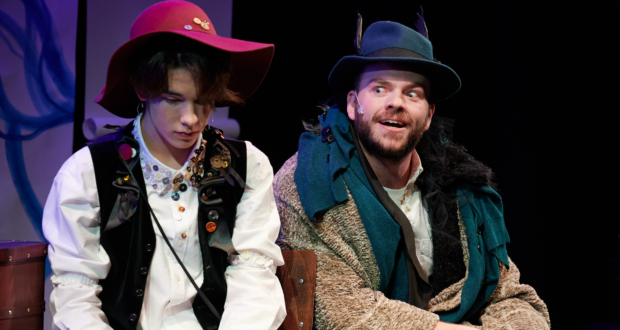Powerful score and vocal talents with an abundance of possibilities for an entrancing journey, but falls short of a deep emotional connection. Summary
Rating
Good
A sensational story based on the Japanese novel ‘Night on the Galactic Railroad’, Galaxy Train tells the adventure of two friends, Giovanni (Joey Zerpa-Falcon) and Campanella (Misato Higashijima), aboard the galaxy train. The boys meet other passengers along the way, each contributing to the boys’ journey to overcome their respective griefs and realise what it is that is truly important to them.
From the start, the audience is introduced to a man, later known as the Bird Catcher (Liam Murray Scott), who tells the Guard of the train (Sinead Mall) that he is willing to give up everything to help Giovanni. The motivation for his actions is gradually unfolded during the course of the story. Giovanni’s family struggles financially after the disappearance of his father. As a result, he is constantly bullied by Zanelli (Jordan Broatch), a critical player in setting the rest of the story in motion. Writers Yojiro Ichikawa and Eden Tredwell lay the foundation well, instigating immediate sympathies toward Giovanni and a sense of unease between him and Campanella, who, until recently, had been a close friend.
Campanella is grieving over the loss of his own mother while trying to help Giovanni. This can make Giovanni a frustrating character at times, with his unwillingness to have an open dialogue and looking at Campanella’s life through a rose-tinted lens. However, the audience can perhaps forgive his stubbornness due to the hardship he experienced.
The original score by Tredwell and the vocal talents assembled are easily the highlights of this production. The songs are exceptionally well polished, fantastically performed by the actors and the lyrics well-aligned with the progression of the story. Every actor delivers a sensational rendition of their numbers, drawing the audience in to an emotional rollercoaster.
Despite the immense potential of this story, elements could be improved to build a richer narrative.BothHigashijima and Saori Oda have powerful voices and neither hesitate to show this off. However, Campanella is a soft-spoken character, and so when he then belts out his feelings that send shockwaves across the room, this does not seem to be a good fit for this character. Similarly, Saori Oda’s portrayal of Campanella’s mother feels overpowering and fails to convey the gentle caressing love of a mother. From a pacing perspective, Campanella’s father calls off a search and pronounces the death of his son after just 45 minutes. Given the many real-life stories of families searching for missing relatives for months and years, Campanella’s father seems to reach a conclusion too hastily. To this effect, the same can be said about Giovanni’s realisation at the end. While it is appreciated that he is encouraged by his encounters aboard the Galaxy Train, his epiphany feels rushed considering what he experienced and the fact that he and his mother remain in poverty. Perhaps a short time skip following the events could help explain the ending.
Much of the story takes place among the stars or around the water. Thus, the back drop of the stage with wave like patterns by Lorelei Cairns is beautifully designed, working well to portray both of these elements when backed up with the appropriate lighting. However, the Studio at the Other Palace Theatre is small; thus, having all six actors on stage at once, moving chairs and briefcase in certain scenes, can come across as too cramped and chaotic.
The spiritual narrative in understanding oneself and the marvel of this intergalactic journey are both surreal and enticing, with the backing of some fantastic original scores and talents. Galaxy Train attempts to convey a rich and emotional story, and although it partially achieves this, it could benefit from some further thoughts into the artistic choices and pacing to assist a more meaningful emotional immersion.
Written by: Yojiro Ichikawa and Eden Tredwell
Directed by: Yojiro Ichikawa
Music and lyrics by: Eden Tredwell
Musical Direction by: Gus Tredwell
Set Design by: Lorelei Cairns
Costume Design by: Naohiro Matsuo
Produced by Théatre Lapis
Galaxy Train plays at The Other Palace until 26 March. Further information and bookings can be found here.
 Everything Theatre Reviews, interviews and news for theatre lovers, London and beyond
Everything Theatre Reviews, interviews and news for theatre lovers, London and beyond



